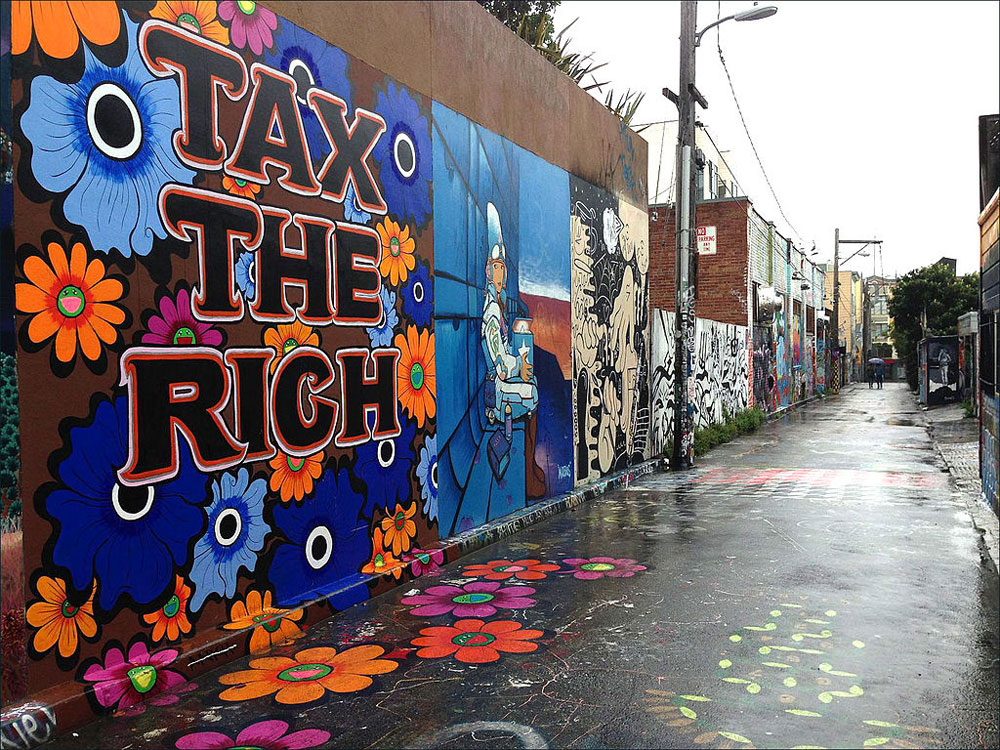
The minimum annual income needed to qualify to buy a median-priced, single-family home in San Francisco is currently $333,270. Yet as Scott Wilson in the Washington Post reports, there is poverty amidst the plenty. Indeed, San Francisco, a city of 884,000—“home to the third most billionaires of any city in the world,” Wilson writes—also has an estimated 7,500 people living on the streets. Some put the actual number of homeless as high as 10,000, a number that is more than one percent of all city residents.
This past January, United Nations special rapporteur Leilani Farha, a Canadian nonprofit housing leader, toured San Francisco. She compared what she saw “with poverty in Mumbai.” After her visit, Farha told Alastair Gee of the Guardian that, “If I turned to San Francisco and there were 100 people who were homeless, I might say, ‘Hmm, this is probably about psychological disability, drug dependence, a history of sexual abuse in their childhood’ or something like that. I might be able to say that it is very individualized. But when you’re seeing the numbers of people who are homeless here and in every other city, you just know it’s structural.”
In response, an advocacy campaign, led by the city’s Coalition on Homelessness, has collected over 28,000 signatures and placed a measure on the ballot called “Our City, Our Home,” reports Alejandra Molina in Next City. The measure, which qualified for the ballot in July, would reportedly double the city’s budget for addressing housing and homelessness, raising an estimated $300 million a year.
While the current housing allocation of $300 million may sound high, the number is deceptive. As Heather Knight of the San Francisco Chronicle explains, only $57 million of that $300 million budget benefits the homeless. The rest goes to rental subsidies, eviction prevention programs, and supportive housing—i.e., programs that keep people from becoming homeless.
The new money that the tax provides, Molina explains, would require that 50 percent of the funds “go toward housing families, youths, and adults. It would pay for subsidies of about 4,000 units of housing. The rest of the money would go toward public health for street-based care of those with mental illness. Funds would also be directed to families needing temporary subsidies to stay in their homes. Money would also be used to add new shelter beds.”
Sign up for our free newsletters
Subscribe to NPQ's newsletters to have our top stories delivered directly to your inbox.
By signing up, you agree to our privacy policy and terms of use, and to receive messages from NPQ and our partners.
In its structure, the business tax is similar, but not the same, as the Seattle proposal. In Seattle, as NPQ covered, the tax would have covered all businesses with revenues in excess of $20 million, with the levy initially set at $500 per employee; the measure passed by the City Council would have raised $275 per employee (until the tax was repealed a month later after considerable pressure from Amazon, Starbucks, and other businesses). The San Francisco tax would instead be a percentage of gross receipts for businesses whose gross receipts exceed $50 million. This builds on existing legislation, as the city phases out its payroll tax system in favor of a gross receipts tax system—in other words, taxing business gross revenue rather than hires.
The rate assessed by the homelessness tax varies by industry, but for firms like Twitter, the rate would be 0.5 percent. (Retail firms, by contrast, would be taxed a lower level of 0.175 percent, an acknowledgement of the narrow margins that are prevalent in that industry). The first $50 million would be exempt from taxation, so a firm taxed at 0.5 percent and with $100 million in gross receipts would pay $250,000 in tax, not $500,000. In addition to Twitter, other San Francisco firms that would be compelled to pay the tax would include Salesforce, Yelp, the Gap, Williams Sonoma, Pacific Gas and Electric, Wells Fargo, and Charles Schwab.
As in Seattle, the San Francisco measure has attracted business opposition. “There is a limit on how high taxes can go before you decide to go to Oakland, where the taxes are much, much lower,” says Jim Lazarus, senior vice president of public policy for the San Francisco Chamber of Commerce. The Chamber has called its campaign “Right Priority, Wrong Approach.”
Some scoff at the Chamber’s opposition, however. Trisha Thadani in the San Francisco Chronicle notes that Evan Owski, a software engineer at LinkedIn and a large donor to the yes campaign, finds the idea that companies would flee the city due to the tax “laughable.”
“This is a classic tactic of big business,” says Owski. “They keep saying ‘job killing’ over and over, which scares people, so they don’t have to keep paying for these vital social services.”
To date, notes Molina, over 100 nonprofit and community groups have endorsed the tax measure. The measure has also received endorsements from a number of public officials, including San Francisco’s congressional representatives Jackie Speier and Nancy Pelosi.—Steve Dubb












